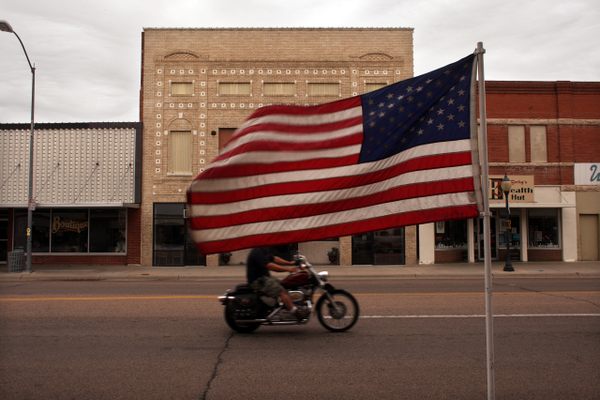S3T June 25 - Roe and reframing, Macro, Supply chains & 3D manufacturing, elites, Roadtrip reads, counting birds...

From civil rights to manufacturing to finance, everything seems contested, under pressure and in flux. In times like these, your best option is to find a way to care for someone who needs it, create a safe spaces and happy moments. In so doing you'll be taking care of yourself.
Notes on the Nation
Supremely Irresponsible
This week a partisan contingent of the Supreme Court recklessly granted state legislatures the power to micromanage women's healthcare. The sad decision to overturn Roe v. Wade marks the crowning achievement of five decades of deception:
- Take a medical procedure that should have never been debatable, and turn it into a political tool for locking in funds, votes and blind loyalty from a key segment of voters.
- Mislead said voters by taking a complex healthcare concern and dumbing it down to a "sanctity of life" smokescreen where the only solution is government overreach that is suspiciously inconsistent with conservative principles.
Sadly many - not all - voters on the religious right fell prey to this intentional misframing of the issue, because they confuse deliberation with agency:
- Deliberation - the process of judging what is the right decision in a given situation
- Agency - who gets to make that decision (the government? or the individual and her doctor?)
In recent elections, over and over I heard people of faith express regret over who they voted for (and the ensuing consequences), but believed they had no choice because of the abortion issue. These individuals are cornered, believing that the sanctity of life was at stake, all because their spiritual leaders failed to help them understand and frame the issue more accurately.
To me, when I think about what to do now, there is no way to avoid this: We have to help people one by one if necessary reframe and rethink what they have been led to believe about abortion.
Reframing
The right to life abortion viewpoint as crafted by political operatives starting in the 1970s cleverly misframes the abortion issue and draws conscientious people into a seemingly valid logical corner:
- Focus narrowly ("abortion stops a beating heart"), do not allow any context about other beating hearts or consequences.
- Remove decision-making authority from women and medical workers and hand it instead to legislators.
- Enforce compliance by using the ultimate fear based threat for conscientious people: if you dare to question our political agenda you'll be marked as a heinous criminal ("baby-killer").
As noted above some operatives on the right gradually came to understand this formula as a very effective way to corner the consciences and control the votes of a significant segment of the population.
Here are points that attempt to correctly frame the abortion issue, in its clinical and personal decision making context:
- Abortion is a medical procedure that sometimes is necessary. It needs to be available and it needs to be safe. To be safe it must be regulated (ie accountable). To be regulated, it must be legal. There is no other way to approach this matter, unless you are willing to put women and children at risk.
- Unsafe abortions are a leading cause of maternal deaths as evidenced by what happens in countries where abortion is illegal. As someone said, "you can't ban abortions, you can only ban safe abortions."
- One's personal position is not the same thing as a public policy position, or law that applies to everyone no matter what. Saying "I'd never have an abortion" is different from saying "I am so knowledgeable that I know that no one else in the entire world will ever need access to the medical procedure known as abortion."
- In decisions where there are multiple factors in play, the decision making process must consider those multiple specific factors. The person responsible for making the decision should never be forced to just blindly follow rules set by others who had no knowledge of the specifics in this situation.
- It is inappropriate to try to craft Biblical arguments for a blanket law that would apply blindly to a whole range of situations that one knows nothing about.
- It is hypocritical to profess deep concern for the unborn, while casting a blind eye to the plight of their mothers. If we are truly concerned for the unborn, then we will take action for the health, safety and financial security of their mothers.
- All of us, across the political spectrum can best honor our beliefs and our respect for life, for women and for families by working together to solve the actual problems in play, rather than playing into the hands of political opportunist: This means working together to better address pregnancy risks and complications, and working to understand and address why unwanted pregnancies occur.
The right's preoccupation with abortion has been politically lucractive but unfortunately distracted immense sums of energy and resources from the actual problems to solve. Reframing can help free us from the logical corner that crafty operatives have put us into so we can focus on what's truly helpful.
Economic impacts of overturning Roe
Aside from the human rights impacts, the Roe v Wade overturn is expected to have economic implications for individuals, corporations and state economies.
- Employers are stepping up to cover cost of travel to states where abortions are legal. This will likely lead to increased costs of care.
- States that ban safe abortions may experience increased birth rates for which they are ill prepared. State economies already lose $105B a year due to existing abortion restrictions and that this amount will increase for states that criminalize abortions. See also: NIH study on impact of abortion on birth rates.
- Researchers expect negative impacts to maternal health, especially among vulnerable populations, as well as an increase in child poverty.
Diana Green Foster, who led the Turnaway Study, predicts 6 impacts of the Roe v Wade overturn supported by data gathered in her research.

Blaming elites
Joshua Kertzer and Jonathan Renshon are digging into "political elites" - who are they exactly, and what culpability do they have for what ails our nation today? You have probably noticed that American's on both the right and the left blame "elites" for problems in our society. The authors point out that there seem to be two kinds of elites:
- Conservatives are likely to refer to "the liberal elites"
- Liberals are likely to refer to "economic elites"
To me, the term elite is most likely our go to label for someone who has some kind of influence or policy making authority yet is "out of touch" in a way that causes their decisions to impose negative consequences on the rest of us.
There are a set of decision makers whose decision have a large impact on the decisions of others: either giving others good options to choose from, or giving them very poor options. Ketzer and Renshon are conducting research intended to better understand the phenomena of "elites" and their impact on society.


Macro - New Territory
This week bitcoin seemed to stabilize in the 20-21K range after dipping into the 17K range over last weekend. The stock market jumped on Friday.
Some think recession worries are overblown while others are expecting the worst. Whichever scenario you subscribe to, we are in very different place than the big energy crises of the 1970s. As noted last week, the current inflation picture has multiple drivers and will not likely respond to simple rate hikes.
This new Deloitte survey finds strong interest in crypto continues across broad industries including consumer goods and services, digital goods, electronics, fashion, food/beverages, home/garden, hospitality and transportation.
- 87% agree accepting digital currencies gives a competitive advantage in the market.
- 85% anticipate crypto payments will be ubiquitous in their industries in 5 years.
- 54% have invested >$1M towards enabling digital currency payments.
At this same time several crypto bailouts are underway, which I think will lead to some adjusted best practices and approaches. My 2 cents here is that institutional and venture investors will probably become more inquisitive about 2 things when making and guiding investments:
- How entangled different ventures, exchanges or portfolio companies are with other entities (and their risks).
- How exposed they are to "leverage" (loans that use their assets as collateral and could be liquidated during sharp downturns in the market).
In other words, developing a thorough understanding of dependencies. This will likely be a theme for regulators as well. In the meantime the current set of issues may still have widening impacts on the availability of capital in both crypto and non-crypto.
Scenarios: Inflation and Supply Chains
A good and not so good scenario for inflation outcomes:
- Scenario A. High Inflation with a Tight Job Market: Job market stays as tight as it is now. Business continue to not be able to find enough workers: so wages go up, and wage-earners use higher salaries to weather the higher inflation.
- Scenario B. High inflation but a Weakening Job Market: Inflation concerns force people who left the workforce to return to the workforce because they need money to pay bills. At the same time however, high inflation reduces spending. Businesses then must reduce costs and therefore staff. In this scenario we'd see layoffs not just from venture backed companies (which has been going in earnest since ~May) but also from non-venture backed companies.
A key determinant for A vs B will be the transition from global to regional supply chains - how quickly can this transition occur and how quickly can new regional supply networks be fully optimized?
As noted in this recent ARK interview with Velo3D, there is a glimmer of hope that improved 3D manufacturing may help smooth this shift from a single global to multiple regionale manufacturing networks.
3D Printing as enabled by Velo3D can allow more consistent manufacturing quality across different factories in different regions. You set up the same equipment in each location, and then share the same design templates and data across all locations. In other words a single supplier could then scale up faster to work across multiple regions with greater consistency that could be achieved via traditional manufacturing approaches.
Interestingly, Velo3D is deliberately focused on solving the toughest 5% of manufactured parts that are the most challenging to 3D print. Once they've solved for the most challenging 5%, they may likely be well postioned take over the other 95%. Players like Velo3D achieving multi-region scale over the next 2-3 years could make a significant difference in the way inflation recovery plays out.
Sensible Ideas
I'm blessed to have a family with kitchen skills and the good sense to be always ready to celebrate life. So here are a few "sensible ideas" about good food and good times!
Dinner (and a book)
Kitchen the classic French Bistro in Chapel Hill is celebrating its 12th Anniversary this month, with a party on June 28. Click here for menu and ticket details. Kitchen has been one of our favorite dinner destinations for years thanks to its excellent food and expertly selected wine picks from southern France. It pairs nicely with the nearby Flyleaf Bookstore. Find your summer read, and then get dinner :)
Breakfast or whenever

Above, one of our favorite breakfast combos: fried egg with peppers and thick sliced bacon over Charleston grits. Spicy peppers with breakfast food and coffee is MAGIC (for me anyway).
BTW, How do you fry your eggs? I use olive oil...well, ok sometimes I also sneak in some butter too. In the link below, Sheela Prakash explains why olive oil works and how to make the perfect Spanish fried egg.
:extract_focal()/https%3A%2F%2Fpocket-syndicated-images.s3.amazonaws.com%2Farticles%2F5372%2F1597338299_k_Photo_Recipes_2019-08-spanish-fried-egg_Spanish-Fried-Egg_120.jpgcrop.jpg)

Summer Reads
A few favorite recommendations perfect for the beach or downtime in the hotel.
Blue Highways
Blue Highways is a roadtrip story about a man down on his luck who decides to live out of his van, driving the back roads and small towns of America on a giant 13,000 mile loop around the country. I originally stumbled across this book while wandering my local library (highly recommended btw), and loved its unmapped serendepity so much I bought my own copy. As he travels, William Least Heat-Moon strikes up conversations with strangers who identify across the political and social spectrum but still - somehow - feel like neighbors.

Kook
Kook is a roadtrip story about a surfer who hones his surfing skills on a roadtrip from Southern California down through the surfing hot spots of Baja. I am not by any stretch a good surfer, but I do love how surfing and just being in the ocean teaches you skills like observation and timing, and offers so many lessons for living. You can't control the wave, but you can ride it - such a simple but powerful analogy for understanding life, markets, and opportunities.

More roadtrip reads?
Richard Kreitner and Steven Melendez collaborated on this beautifully done interactive map that shows the routes of 11 epic roadtrip reads of American literature.

Something else? Start with your favorite kids book...
Ever notice that you gravitated to certain kids books more than others when you were little? Why do different kids gravitate to different kinds of kids books? And does this presage anything about their future? Katie Yee thinks so: In this fun reading list, Katie matches you up to recommended reads based on your favorite childhood book!
Contranyms
And when you're doing your summer reading you might have fun watching for contranyms. The word "seed" is a contranym: it can have opposite meanings depending on the context in which it is used. "Left" is another one. How many can you name? Jot down as many as you can think of and then compare it to Judith Herman's list of contranyms.
Nature Notes

How to count birds
Have you ever seen a long undulating stream of grackles flying across the sky? Or an uncountable convention of tundra swans on a pecosin? When you see these large spectacles, counting them can be a challenge. The different ways people count birds can also be a challenge for the researchers who aggregate data from all the birding apps we use. So here finally is your complete guide to the latest in advanced bird geekery: A standard way to properly count and report birds. You'll thank me - well if not you, maybe the researchers will.
Promoting climate health - the Well Done Foundation
Did you know there are approximately 2.15 million unplugged abandoned wells scattered throughout the United States? The Well Done Foundation promotes climate health by plugging orphaned or abandoned oil and gas wells. The effect of capping a well is one of the most instant, highest impact per dollar of any of the climate health organizations. Visit WellDoneFoundation.org to learn more and get involved.
Final Note
A note about this week's headline art piece: The coat hanger has been a symbol of the urgency and importance of access to safe abortions. As of publication, stories are breaking about TikTokers and others sending coat hangers to the Supreme Court to protest the overturn of Roe. Some medical experts are cautioning about excessive use of violent or stigmatizing imagery because you never know how it can impact someone who is going through something right now. I hope I am striking an appropriate balance between making a point vs being uncessarily graphic, but welcome feedback.
Truly this is another heavy week - a time to be there for each other, and support each other as best we can.
Thank you again for subscribing and sharing S3T! Feel free to forward this to a friend and continue the conversation on the S3T Discord, Twitter or LinkedIn.
Ralph
Opinions mine. Not financial advice. I may hold assets discussed.





Member discussion